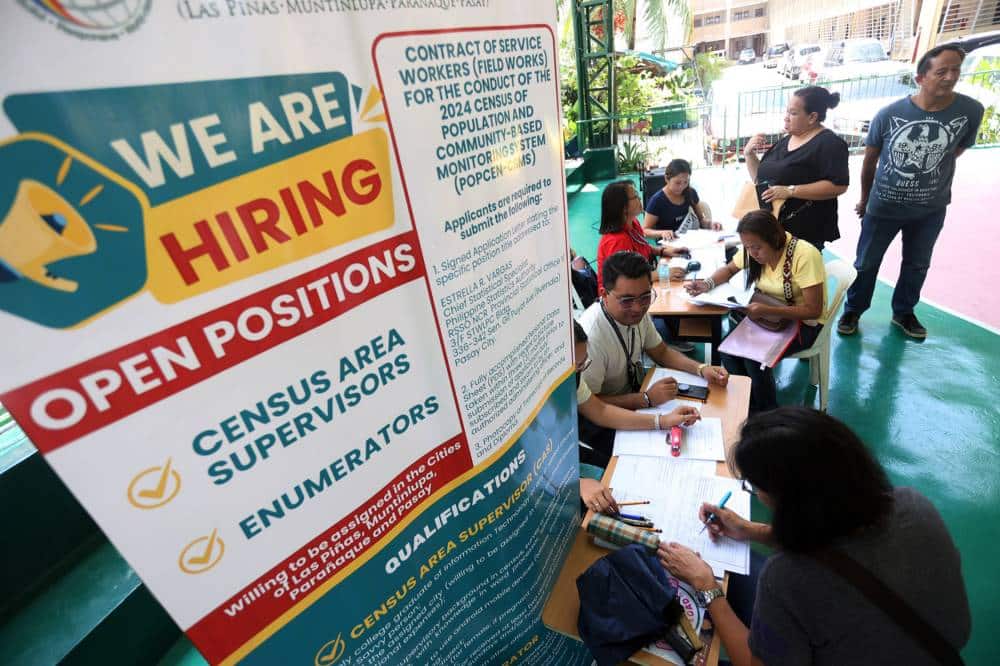PH jobless rate rose to 4.7% in July

JOB HUNTING Job seekers attend a recent job fair at Juan Sumulong Elementary School. The Philippine Statistics Authority reports a surge in the number of young Filipinos aged 15 to 24 who are looking for a job, contributing to the hike in the overall unemployment rate in July. —NINO JESUS ORBETA
The country’s unemployment rate surged to a one-year high of 4.7 percent last July as more young Filipinos joined the labor force but have yet to find a job, the Philippine Statistics Authority (PSA) reported on Friday.
Preliminary results of the PSA’s July round of the Labor Force Survey (LFS) showed that the jobless rate was at its highest since the 4.9 percent in July 2023, translating to 2.38 million jobless Filipinos.
This was higher compared to the 3.1 percent jobless rate in the previous month.
READ: July unemployment rate at 4.7%, up from 3.1% in June
National Statistician Claire Dennis Mapa attributed the rise in the unemployment rate to the increase in the number of jobless young Filipinos or those aged 15-24, who accounted for approximately 43 percent, or 1.02 million, of the total unemployed population.
“So one of the reasons is the increase in the number of our youth who are unemployed, which contributed to the numbers. We saw that in July, they are the ones who have graduated, those who are in college or not in K-12. So they entered the labor market and the rest of them could not find a job,” Mapa said during a briefing.
Youth unemployment rate rose to 14.8 percent from 8.6 percent in the previous month, equivalent to an additional 440,000 unemployed youth.
Better absorptive capacity
Ruben Carlo Asuncion, chief economist at Union Bank of the Philippines, said absorbing the new entrants to the labor force was a challenge considering the high interest rates that slowed down economic expansion.
READ: Jobless rate falls to 3.1% in June, says PSA
Asuncion noted that the benefits of lower interest rates, which include better absorptive capacity of the labor market, may take some time to be felt.
John Paolo Rivera, senior research fellow at state-run think tank Philippine Institute for Development Studies, shared this view, saying that there may not be enough job opportunities as companies are still struggling to expand amid high borrowing rates.
Mismatch
“There may also be job opportunities that cannot be filled due to mismatch [between] demand and supply of labor. Skill sets required for jobs are not matched, salary and wage expectations of the younger generation are not matched,” Rivera added.
Meanwhile, job quality remained stagnant as underemployment stood at 12.1 percent in July, unchanged from the previous month but an improvement from 15.9 percent a year ago.
Still, this was the highest since the 14.16 percent logged in April.
However, the ranks of underemployed Filipinos—those who want longer work hours or an additional job—went down to 5.78 million, down by 306,000 from June.
PSA data also showed that 50.07 million people were part of the labor force during the month, down by 1.8 million from June’s 51.90 million.
With this, the labor force participation rate—the proportion of the working-age population (15 years old and over) that is part of the total labor force—slipped to 63.5 percent from 66 percent as some Filipinos pulled out of the labor force.
By sector, services remained the top employer in July with an employment rate of 60.8 percent followed by agriculture with 21.2 percent and industry with 18 percent.
In a statement, National Economic and Development Authority (Neda) Secretary Arsenio Balisacan said that they are committed to mobilizing a whole-of-government approach to secure job-generating investments in the country.
“Neda is finalizing the Trabaho Para sa Bayan Master Plan, which is envisioned as the nation’s comprehensive and strategic framework for enhancing job opportunities and work skills for Filipinos,” he said.

